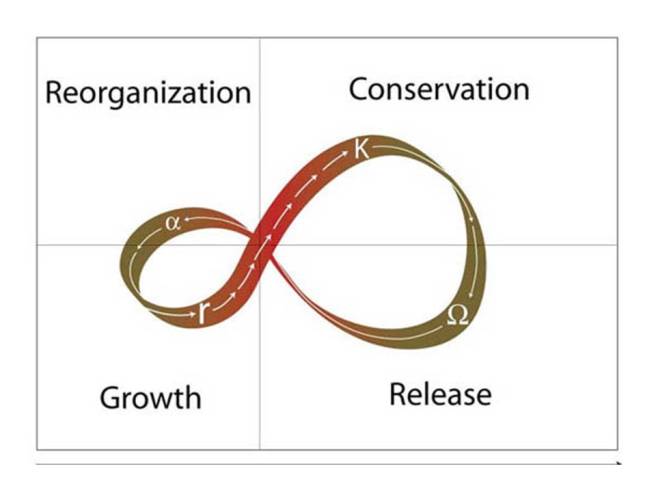 Early on in his career, the ecologist and systems thinker, C.S. Holling discovered that complex adaptive systems did not tend toward equilibria, but toward maximizing diversity over deeper evolutionary time. In early 2000, he and L. Gunderson identified the dynamic cycle that expressed the patterns we see in complex ecologies, as well as the transitioning forms and periods of dynamic upheavals. They called this process the panarchy cycle. The panarchy cycle is the first truly evolutionary description of ecological systems — accounting for co-adaptation of species through both transitional periods of increasing and decreasing diversity, increasing and decreasing connectivities, increasing and decreasing levels of order and disorder. Essential to this process is both creative construction as well as creative destruction. Soon Holling and Gunderson incorporated the panarchy cycle into a larger theory of resilience, and founded The Resilience Alliance.
Early on in his career, the ecologist and systems thinker, C.S. Holling discovered that complex adaptive systems did not tend toward equilibria, but toward maximizing diversity over deeper evolutionary time. In early 2000, he and L. Gunderson identified the dynamic cycle that expressed the patterns we see in complex ecologies, as well as the transitioning forms and periods of dynamic upheavals. They called this process the panarchy cycle. The panarchy cycle is the first truly evolutionary description of ecological systems — accounting for co-adaptation of species through both transitional periods of increasing and decreasing diversity, increasing and decreasing connectivities, increasing and decreasing levels of order and disorder. Essential to this process is both creative construction as well as creative destruction. Soon Holling and Gunderson incorporated the panarchy cycle into a larger theory of resilience, and founded The Resilience Alliance.
The panarchy cycle describes four looping stages of evolutionary ecology: growth, conservation, release and reorganization. Each of these is associated with a greek letter that can be considered a type of “stage strategy” that the ecology undergoes:
*Г-phase of growth where species and cultures grow and diversify to exploit new opportunities and develop entirely new ecological ways of being.
Κ-phase of conservation, where climax species are tightly connected and organized, and ecologies and cultures stabilize into mature, often hierarchically nested systems, where there is little or no room for innovation or growth.
Ω-phase of release (the “backside” of the mobius strip) where mature systems destabilize and collapse, and become increasingly discontinuous and chaotic which opens the field for
* а-phase of reorganization in completely new ways, which creates a new field of conditions and possibilities for the next growth phase
Soon Holling and Gunderson were not alone in seeing the far-reaching implications that panarchy had with respect to the human evolutionary ecology, including political, cultural, economic and social conditions.
Pretending once again, to be the ageless observers of the human habitation of earth, it is easy to see that our success has been won through long, continuous stretches of K-strategies. K-strategies are developmental patterns, of long accumulated progress to higher, more complexly inner-dependent and unifying collective associated with decreasing diversity of types — like the imaginary trajectory to global hive mind. The reason why this cannot be the end of the story, is because it is at the “top end” of the K-strategy stage, that the system is least resilient to even relatively minor perturbations, and most precarious to complete collapse.
Through 2000 years of exclusive reliance on K-strategies, humans have become to be the most successful species on the planet, as well as the most precarious for complete systems collapse.If the law of evolutionary ecology applies to humans, collapse will inevitably fall upon us– but unlike other species, we can, with modern ideas like panarchy and epistemic frameworks like resilience theory, learn to be skillfully prepared to surf the “back slide of the cycle” in ways never before possible in evolutionary history.
If skillful enough, and willful enough, we can learn to design adequate systems not merely to make the Ω-phase bearable or even survivable but to actually design Ω-pattern integrity into our strategies of human behavior and collective action.This more than anything, I believe, is key to our role as humans in the planetary ecology. However, this requires us to disembed from the developmental bias in our narratives and the exclusive reliance on K-strategies in our political, social, economic and cultural policies. It requires us to give up on the false utopianism of a single, hyper-complexified, hyper-unified society, somehow surviving on unilateral terms with the planet. It requires us to divest of the notion of a single, global economy, of a massive, globotomized brain, of a fantasy of many worldviews all conflated into one common, reproducible understanding of what is possible and what is not; of immodest notions of a super-hyper-meta binary-based algorithm to replace the richly perverse orgasmic rhythms of our evolutionary imperative.

Hé Bonnie, good work!!! Can we have RSS, so that I am sure I don’t miss any post (and receive it in my reader)?
Thanks a lot!
Ria
I love the way you are nudging us to break outside the spell. I love the gift of your spirit and thought. Want to grok fully in mind and deed this move, and contribute to our reinvention/reintegration.
Lovely work!